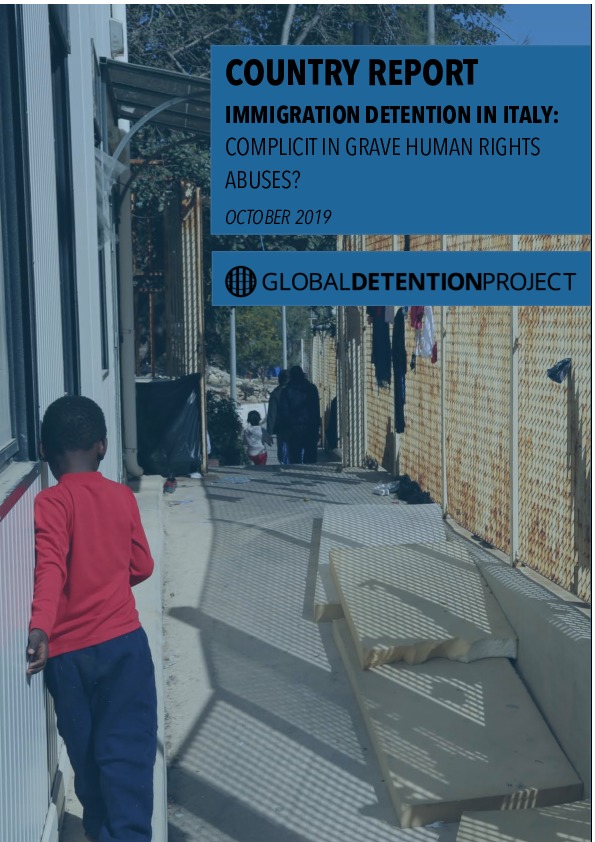The Italian Minister for Agricultural Policies, Teresa Bellanova, said (6 May) that she wants to regularise some 600,000 undocumented workers. She said: “If this doesn’t happen, the State becomes not only an accomplice but also a promoter of illegality in which these workers are forced.” The confederation of Italian farmers said the regularisation of undocumented […]
Italy
Italy: Covid-19 and Detention
The Italian government declared its ports “unsafe” due to coronavirus, and will not authorise the landing of migrant rescue boats until after the end of the emergency. […]

Italy: Covid-19 and Detention
Campaign groups such as the “Campagna Nazionale contro la detenzione amministrativa di migranti” have highlighted the risks of the spread of Coronavirus within immigration detention centres in Italy, especially given the poor hygiene conditions and particular vulnerability of detainees. In addition, Italy’s national detainee rights guarantor, Mauro Palma, has urged the government to assess whether […]

Physical Fences and Digital Divides: Final Report of the Global Detention Project Special Investigation into the Uses of Electronic Media in Today’s Migration Journeys
The “refugee crisis” helped spur a “tech turn” in how people travel across borders and how governments and others respond to these movements. Everyone from civil society organisations—including the Global Detention Project—and individual activists to humanitarian technologists, government officials, and international bureaucrats have experimented with social media and other new forms of digital technology to […]

Crossing a Red Line
“Crossing a Red Line” is the final report of the Red Line Project, a collaborative initiative led by the Hungarian Helsinki Committee that was aimed at documenting the shift from “reception” to “detention” in EU border regions and the implications of this shift on asylum seekers. The project also counted on the participation of the Global Detention Project, the Bulgarian Foundation for Access to Rights, the Greek Council for Refugees, and the Italian Council for Refugees. […]

Italy: Complicit in Grave Human Rights Abuse?
Immigration Detention in Italy (2019 Report): An important European destination for asylum seekers and migrants crossing the Mediterranean from Africa, Italy has been an aggressive proponent of draconian migration control practices, spurring accusations that the country has been complicit in grave human rights violations. During the tenure of notorious former Interior Minister Matteo Salvini, Italy […]

“Red Line”: The Rise in Detention of Asylum Seekers at the External Borders of the EU
Led by the Hungarian Helsinki Committee (HHC), the “Red Line” project is working to reduce unnecessary and unlawful use of detention as a deterrence measure for asylum-seekers and irregular migrants in Europe, with a particular focus upon four key irregular migrant entry states: Hungary, Bulgaria, Greece, and Italy. In many such countries, “reception” has morphed […]
Briefing on Social Media, Human Rights, and Migration
On 15 November, the Quaker United Nations Office (QUNO) and the Global Detention Project (GDP) hosted a briefing and discussion for NGOs, IGOs, and diplomatic missions on the role social media and other new digital technologies play in migration journeys, with a special emphasis on their use in the context of detention and migration control in North Africa and the Mediterranean. […]

Immigration Detention in Libya: “A Human Rights Crisis”
Libya is notoriously perilous for refugees, asylum seekers, and migrants, who often suffer a litany of abuses, including at the country’s numerous detention facilities. Conditions at these facilities, many of which are under the control of militias, are deplorable. There are frequent shortages of water and food; over-crowding is endemic; detainees can experience physical mistreatment […]

The EU Hotspot Approach: Hotspots and Plethora of Freedom-Restricting Measures
This themed blog series organized by GDP Researcher Izabella Majcher for the Oxford University-based Border Criminologies examines the EU hotspot approach from the perspective of the right to liberty and freedom of movement, highlighting the unclear division of roles and responsibilities between EU agencies and host member states, the blurred line between detention and reception, substandard material conditions, a lack of transparency, and differential treatment based on nationality, among a host of other concerns. […]




